Dahaad: Portrait Of An India Divided By Religion, United By Prejudice
This is #CriticalMargin, where Ishita Sengupta gets contemplative over new Hindi films and shows. Today: Reema Kagti and Zoya Akhtar's Dahaad.
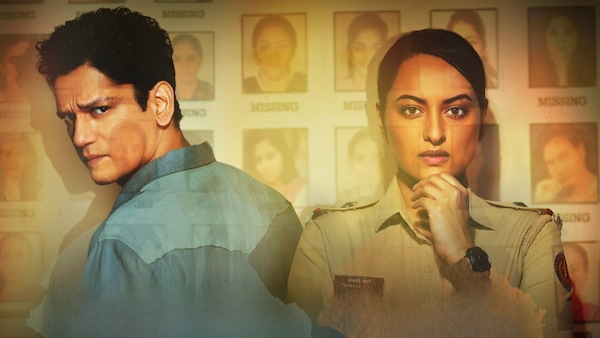
Last Updated: 12.00 PM, May 12, 2023
Dahaad, the sensational new Zoya Akhtar-Reema Kagti collaborative series, opens with a genius thematic trickery. In Rajasthan’s quaint little town Mandawa, a Hindu girl has eloped with a Muslim boy. The inter-faith relationship attracts the attention of a right wing local political party who swiftly turns the incident into an issue. A group of people holding flags flock outside the police station and condemn it as an instance of Love Jihad, an Islamaphobic idea which falsely propounds that Muslim men lure Hindu women for forcible conversions. The girl’s father is a wealthy man, who threatens the officials with dire consequences if they cannot find his daughter. The boy’s father is petrified. Amidst the commotion stands another man whose sister ran away two months ago and never contacted him since. He has been in the precinct of the police station before but his repeated follow ups on the missing complaint evoked no furore. His sister is an adult, he is told. But then, so is the girl who has fled. The only difference is the religion of the men they chose to disappear with. Looking at the disparity of interest, something in the man shifts. He joins the crowd and raises his hand in protest.
This sequence, which arrives fairly early, is a knockout moment. Even as a standalone scene it is a terrific testimony to the India we have come to inhabit where the interest of the public is tied to religion and that itself has been revamped as public interest. It also serves as an unsettling reminder of the country’s current social climate which is increasingly warranting descent into bigotry as the only way to be heard. The first episode of Dahaad is preoccupied with depicting the menacing consequences of letting religion take precedence over reason, culminating in a chilling scene where a Muslim man is tied to the railway tracks by political party thugs under the false assumption of his affair with a Hindu woman.
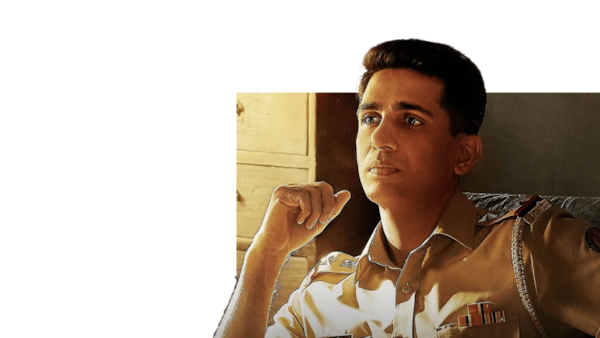
In the landscape of Hindi language storytelling, critiquing right-wing conspiracy theories has come to dominate the works of liberal filmmakers. More recently in Afwaah (‘Rumour’ in English), Sudhir Mishra documented the communal volatility plaguing India. Set in a fictional place, although modelled on Rajasthan, the film portrayed the convenience with which misinformation — Love Jihad included — is peddled by self-serving people to justify the futile deaths of Muslims. Dahaad unfolds in a similar vein and then, in a narrative sleight of hand, unravels as something else. The eight-episode series, searing in intent and blistering in execution, uses one kind of discrimination as a smokescreen to render a portrait of a nation beset with distinct kinds of inequity. The deployment of the mirage becomes the show’s way of baiting the officers at the Mandawa police station — and the hyperaware audience we have come to be — to draw attention to larger issues, arguing in the process that the divisiveness at the fore is manufactured to hide and sustain the biases in the background. There is a difference of religion between the two men the girls ran away with, but there is a disagreement of social mobility between the two men they have left behind. That we do not notice this till much later is the trickery.
Young girls in and around the small towns of Rajasthan are going missing. All under similar circumstances. A cursory investigation into the absence of the man’s sister from the first episode, egged on by a lie that she eloped with a Muslim man, opens up a curious design. Her call records reveal that for months she had been talking to someone whose number is registered as Javed. When the Mandawa police pull him up, he tells a similar story. His sister has run away with someone and has not been in touch since. Her call records point to another girl she had been in touch with. She too had been talking to someone, eloped leaving behind a letter for her parents, and never returned since. Every discovery of a missing girl is accompanied by a similar outline. As the probe deepens, the bodies of some of the missing women are located in morgues. There is a pattern here too: they were found dressed in bridal clothes, in public toilets which were bolted from the inside. On the surface, these appear to be cases of suicide.
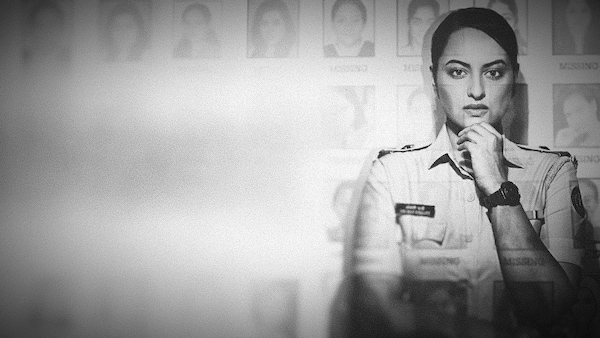
As the premise of a crime thriller, this is ingeniously compelling. A series of girls go missing and the only trail they leave behind is more trails. But the fascinating bit about Dahaad is the way it uses this as an ingress to inspect the contours of a minority existence, beleaguered by social conventions and gender expectations; it is equally riveting how the broader context of young girls talking to men and deciding to run away with them lends a specific subtext to the loneliness of their reality. That most families did not even lodge a complaint, a crucial detail in a crime thriller prone to thickening the plot, assumes the attribute of a social parable, the lesson here being that all women are unequal but some are more unequal than others.
This is why among the coterie of officials headlining the case, which includes an upper-caste, honest, progressive man Devi Singh (Gulshan Devaiah), it takes a lower-caste female police officer, Anjali Bhaati (Sonakshi Sinha), to link the cumulative absence of the girls to the work of a single man. It is not just studied insight that leads her to such a conclusion but lived-in truth that has made her attuned to the abiding face of persecution in the guise of hope that women, socially cloistered as her, remain vulnerable to. Because she knows that even as she labours to depart from normative gendered behaviour, like riding a bike and learning judo in a room full of men, changing her surname and partaking in a profession that promises social elevation, her identity continues to be reduced to gender and caste.
Such discrimination is not just an individual discretion but a social propagation. Dahaad progresses informed with this, reckoning with the dichotomy of a system that nurses stratification while deeming it as an offense. The show’s choice of an antagonist then is as much as a depiction as it is a representation. His face is revealed in the first episode; so is his name: Anand Swarnakar (Vijay Varma), an upper-caste, privileged man. Given the early disclosure, the point of the series shifts from identifying a criminal to dissecting reasons for the sustenance of prejudices which are considered a crime.
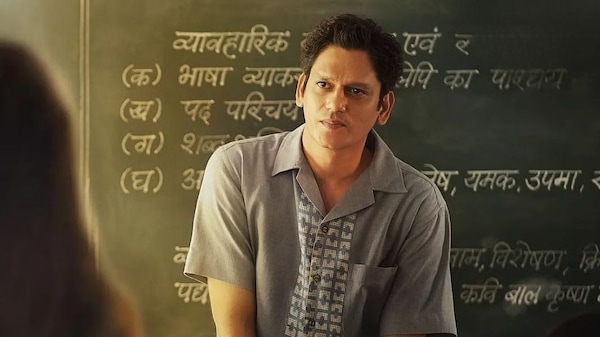
Unlike his father who is an obviously regressive man, Anand poses as a liberal. And unlike his younger brother, he abstained from joining the family jewellery business and catering to the rich. He is a professor in a women’s college, and is introduced to us as he teaches a poem by Balkrishna Garg, an Indian poet who worked for the upliftment of marginalised communities. Anand is not just aware of cultural classifications but strives to dismantle them. On weekends, he willingly travels in his van to the interior parts of the city to teach kids. He is the upper-caste, Hindu male saviour, the kind who is touted to bring about change.
And yet, every aspect of this personality is a disguise to conceal ingrained apathy. Education does not reform him but grants him the tool to hide the loathing better, lends him the apparatus to hone his hatred with better precision. Through the duality of the character, Dahaad sharpens its critique on the enduring subjugation of minorities by laying bare that the abhorrence against them is common across the spectrum of politics, even when one side assumes they are more evolved than the other. Ideology, after all, is frequently a creation of upper-caste men to make them feel better about themselves.
Varma gives a career-defining turn as Anand. In some aspects, the role is similar to the one he essayed in Darlings (2022) but the actor imbues this with his own brand of creepiness. He inhabits the artifice of his own making with such exactness that the dualism of the character never feels like a jolt. There is a particular scene when Anand is being investigated in a police station and he momentarily feels entrapped. Varma enacts this nervous energy by speaking faster than usual, imperceptibly breathing hard. It is such a bravura performance that it is reminiscent of Irrfan’s craft.
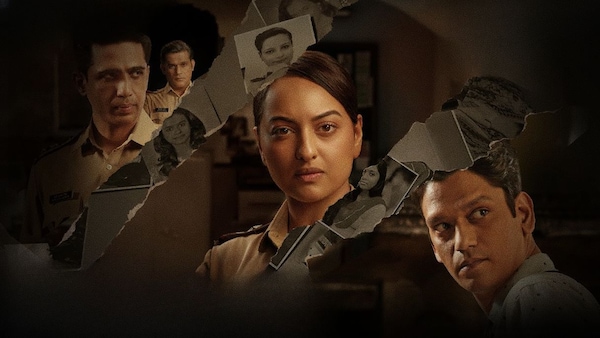
A major strength of the show is its adept utlisation of the actors involved. The web series marks Sinha’s first excursion into long-form storytelling and the actor is immensely impressive as a lower-caste female cop. Her physicality and scowl lend themselves well to a role that remains subjected to gratuitous stares. Devaiah is superlative as the strait-laced police officer, who at some point realises — to his own horror — that he might not be as upright as he thinks he is. Sohum Shah’s character is afforded the most redemptive arc and the actor fits just right.
Having said that, it is not a perfect show. The last episode, also the shortest, feels particularly rushed — as though a good 10 minutes were unceremoniously edited out of it. But Dahaad is so good for so long, so slyly addictive even as it makes no bones about retaining the mystery, that these become minor quibbles. The allure of the series remains that it masquerades as a crime thriller when it really is a social tragedy. Across eight episodes, it painstakingly etches out the loneliness and precarity of existences that are rarely acknowledged. Dahaad literalises the villainy they are subjected to but what it really aims for, is to validate the perilousness of their reality. It invites you in promising suspense, but offers you insight instead.
What Akhtar and Kagti have achieved is a stupendous exposition of the female gaze where a woman saves the day but men save themselves by unlearning to be better. Dahaad is a superlative work of fiction that dresses reality in shades of topicality and surrounds a roar with noise to draw an unadorned portrait of India — divided by religion but united by prejudice.
